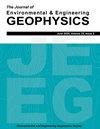Two-dimensional Time-domain Full Waveform Inversion of On-ground Common-offset GPR Data Based on Integral Preprocessing
IF 0.7
4区 工程技术
Q4 ENGINEERING, GEOLOGICAL
引用次数: 1
Abstract
Full waveform inversion (FWI) is an advanced inversion technique for ground penetrating radar (GPR), which could provide quantitative, high-resolution subsurface imaging. FWI has been used widely to process crosshole and on-ground multi-offset GPR data, but its application to on-ground common-offset GPR data is more difficult and being developed. This is mainly because that on-ground common-offset GPR has much less coverage of the subsurface and mainly includes reflective information. The application of conventional FWI to pure reflection data in the absence of a highly accurate starting velocity model is difficult. Here, we demonstrate a means of achieving this successfully by preprocessing the observed data and the residual fields with an integral algorithm, which could produce a more reasonable gradient and therefore lead to better inversion results. Several cases verify the effectiveness of this method. We achieve the simultaneous inversion of relative permittivity and conductivity for on-ground common-offset GPR, and discuss the trade-off between permittivity and conductivity in details. According to the inversion results of test models, it seems that the inversion result of relative permittivity is more credible in most cases.基于积分预处理的地面共偏移GPR数据二维时域全波形反演
全波形反演(FWI)是一种先进的探地雷达(GPR)反演技术,可以提供定量的、高分辨率的地下成像。FWI技术在井间和地面多偏距探地雷达数据处理中得到了广泛应用,但在地面共偏距探地雷达数据处理中应用较为困难,目前仍处于发展阶段。这主要是因为地面共偏移探地雷达对地下的覆盖范围较小,主要包含反射信息。在没有高精度的启动速度模型的情况下,传统的FWI很难应用于纯反射数据。在这里,我们展示了一种成功实现这一目标的方法,即使用积分算法对观测数据和残差场进行预处理,可以产生更合理的梯度,从而获得更好的反演结果。算例验证了该方法的有效性。实现了地面共偏置探地雷达相对介电常数和电导率的同时反演,并详细讨论了介电常数和电导率之间的权衡。从试验模型的反演结果来看,在大多数情况下,相对介电常数的反演结果更可信。
本文章由计算机程序翻译,如有差异,请以英文原文为准。
求助全文
约1分钟内获得全文
求助全文
来源期刊

Journal of Environmental and Engineering Geophysics
地学-地球化学与地球物理
CiteScore
2.70
自引率
0.00%
发文量
13
审稿时长
6 months
期刊介绍:
The JEEG (ISSN 1083-1363) is the peer-reviewed journal of the Environmental and Engineering Geophysical Society (EEGS). JEEG welcomes manuscripts on new developments in near-surface geophysics applied to environmental, engineering, and mining issues, as well as novel near-surface geophysics case histories and descriptions of new hardware aimed at the near-surface geophysics community.
 求助内容:
求助内容: 应助结果提醒方式:
应助结果提醒方式:


